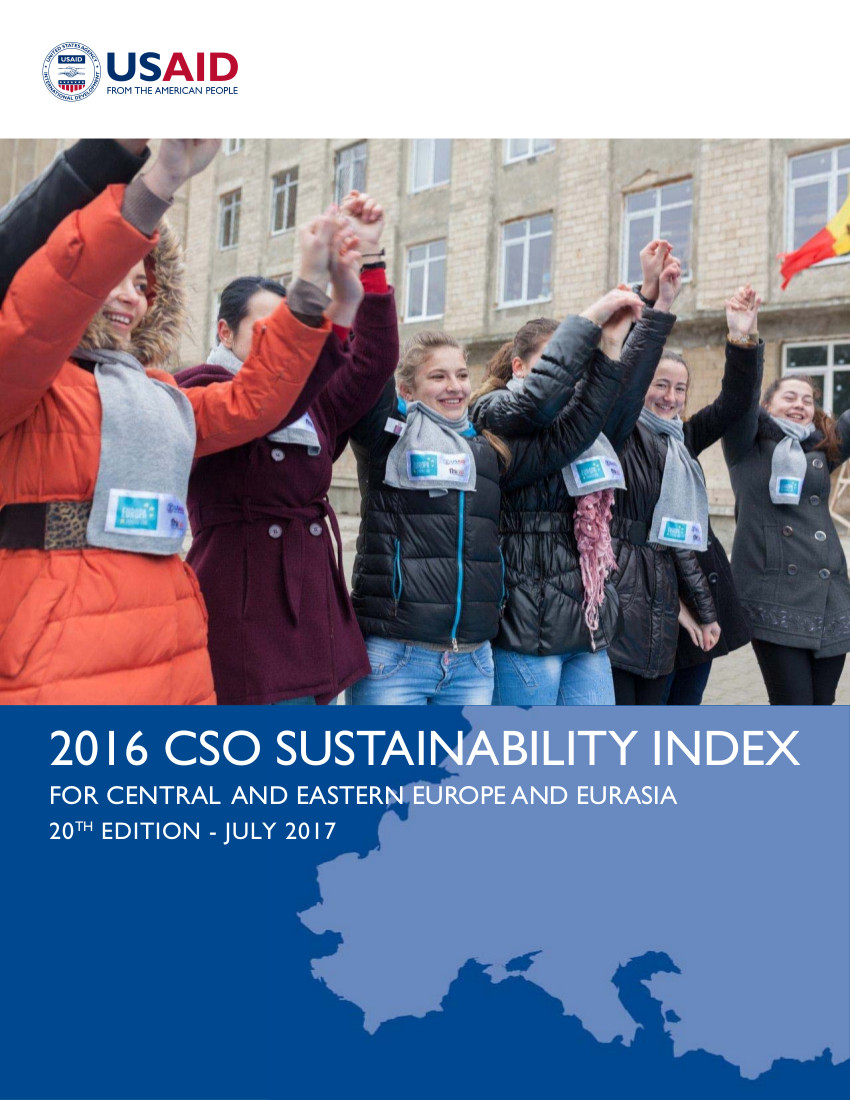- What We Do
- Agriculture and Food Security
- Democracy, Human Rights and Governance
- Democracy, Human Rights and Governance Strategy
- Supporting Free and Fair Elections
- Supporting Vibrant Civil Society & Independent Media
- Protecting Human Rights
- Promoting Accountability & Transparency
- Importance of Democracy, Human Rights, & Governance to Development
- Countering Trafficking in Persons
- Economic Growth and Trade
- Education
- Ending Extreme Poverty
- Environment and Global Climate Change
- Gender Equality and Women's Empowerment
- Global Health
- Water and Sanitation
- Working in Crises and Conflict
- U.S. Global Development Lab
CSO Sector Development In 2016
Civil society organizations (CSOs) and individuals in Europe and Eurasia are increasingly learning to adapt to constricting civic space by finding new ways to advocate, to mobilize citizens, and to raise funds. Results from the 2016 CSO Sustainability Index (CSOSI) for Central and Eastern Europe and Eurasia, show that a number of countries, including Hungary, Russia, Azerbaijan, and Macedonia, have experienced democratic backsliding. This backsliding now threatens both the sustainability of CSOs, and also citizens’ fundamental freedoms of assembly, association and expression. From the mass protests in Macedonia to those in Poland, this year’s report shows that public demonstrations continued to be an important tool in 2016 to bring both the public’s and policymakers’ attention to issues of public concern. CSO sustainability in many countries in the region is increasingly challenged by decreased access to funding and constricting operating space. On a positive note, this year’s report highlights progress in financial diversification through innovative practices. As governments restrict access to foreign funding and reduce state funding to CSOs, organizations are increasingly turning to crowdfunding as an alternative source of funding. In addition, crowdfunding appears to be taking hold in a broader range of issue areas, as CSOs reported some success with fundraising for political and human rights activities in 2016, in addition to the social, environmental, and cultural activities it originally targeted. In other contexts, however, government restrictions have made it highly difficult for CSOs to operate. In Azerbaijan, for example, informal surveys indicate that at least two-thirds of CSOs have suspended their activities over the past few years, and surviving CSOs have lost most of their staff due to insufficient funding.
Background
The Civil Society Organization Sustainability Index (CSOSI) has been used since 1997 to assess the sustainability of the CSO sector. The Index has expanded considerably since its inception – it went from covering 18 countries in the Europe and Eurasia Region, to covering over 60 countries in different regions around the world. By using standard indicators and collecting data each year, the CSOSI enables users to track developments and identify trends in the CSO sector over time while allowing for cross-country and cross-region comparison. It is used by CSO advocates, development partners, and academics to assess international and regional trends in the civil society sector and to identify common obstacles impeding the sector's sustainability, such as the legal environment, organizational capacity, and financial viability.
Approach
The Index measures the sustainability of each country's CSO sector based on the CSOSI's seven dimensions: legal environment, organizational capacity, financial viability, advocacy, service provision, infrastructure, and public image. The CSOSI's local implementing partners in each country lead the process of organizing and convening a diverse and representative panel of CSO experts. Country panels discuss the seven dimensions for the year being assessed, and reach consensus on the scores corresponding to each dimension. With the information provided by the expert panel along with desk research, the CSO implementing partner then develops a narrative report.








Comment
Make a general inquiry or suggest an improvement.